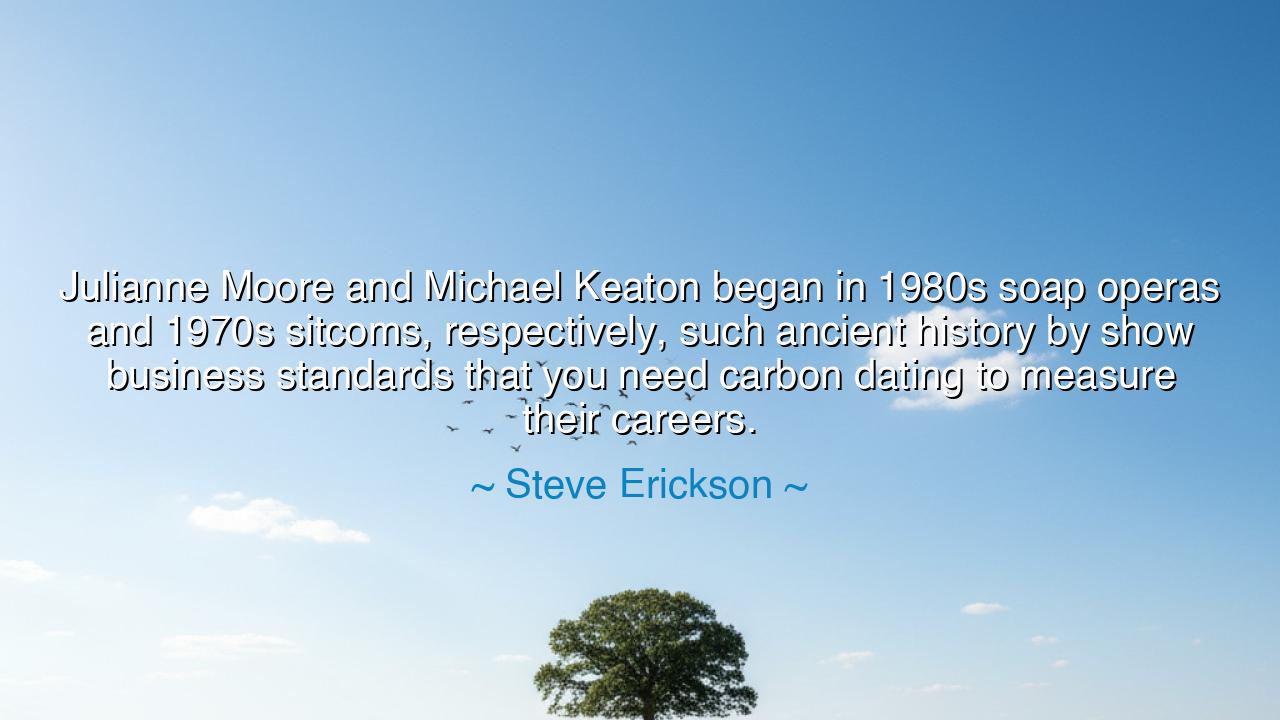
Julianne Moore and Michael Keaton began in 1980s soap operas and
Julianne Moore and Michael Keaton began in 1980s soap operas and 1970s sitcoms, respectively, such ancient history by show business standards that you need carbon dating to measure their careers.






In the words of Steve Erickson, the novelist and cultural critic whose prose often dances between irony and insight, we find a meditation on the fleeting nature of fame: “Julianne Moore and Michael Keaton began in 1980s soap operas and 1970s sitcoms, respectively, such ancient history by show business standards that you need carbon dating to measure their careers.” On the surface, his tone carries humor — a playful jest about the passage of time. Yet beneath the laughter lies something more profound: a commentary on impermanence, on how swiftly the world of art and recognition moves, and on the rare endurance of those who, like Moore and Keaton, have withstood the erosion of time in an age that devours its own idols.
The meaning of this quote rests upon the contrast between the sacred timelessness of human artistry and the hurried forgetfulness of modern culture. In saying that the 1970s and 1980s are “ancient history by show business standards,” Erickson reveals how entertainment, though ever seeking newness, often suffers from amnesia. In ancient times, poets and actors who mastered their craft were immortalized — Sophocles, Euripides, Shakespeare, their names etched into eternity. Yet in today’s world, where fame burns bright and dies quickly, to have endured for decades is to belong to another age, a kind of living fossil of excellence. Erickson’s jest about “carbon dating” becomes, therefore, both a critique and a tribute — a recognition that true endurance in art is as rare and precious as an ancient relic.
The origin of his reflection lies in the fleeting heart of show business itself — an empire built upon beauty, novelty, and youth. In that realm, the past is quickly forgotten, for the stage is always hungry for the next performance, the next face, the next sensation. Yet Erickson’s words shine a light on the paradox: those who endure longest are often those who embrace change, not resist it. Julianne Moore and Michael Keaton began in humble roles, in serialized dramas and lighthearted comedies, but through perseverance, transformation, and the constant refining of their craft, they transcended the limits of their beginnings. In this way, Erickson’s observation becomes a reflection on resilience — on the sacred art of remaining relevant not through fashion, but through authenticity.
This truth is not confined to modern actors; it has echoed through all ages. Consider Sophocles, who wrote Oedipus Rex in his eighties, long after many of his contemporaries had been forgotten. Or the sculptor Michelangelo, who carved the Rondanini Pietà while frail and near death, still searching for perfection. These masters, like Moore and Keaton in their own age, remind us that longevity in art is the reward of dedication, of a love so deep for one’s craft that it defies the fleeting applause of the crowd. Erickson’s words, though spoken with wit, therefore carry a tone of reverence: they acknowledge the quiet heroism of those who remain steadfast in a world of constant reinvention.
There is also, in his phrasing, an awareness of mortality — not only of careers, but of culture itself. The reference to “carbon dating” evokes archaeology, the study of civilizations long gone, buried beneath time’s sands. In likening veteran actors to ancient artifacts, Erickson gently mocks society’s obsession with the new, yet simultaneously warns of the fragility of memory. Every generation believes itself at the height of innovation, forgetting that it, too, will one day be measured by the dust it leaves behind. Thus, his humor hides a lament — that modern culture, in its haste, loses touch with its own lineage, and in doing so, forgets to honor endurance.
The lesson within Erickson’s quote is therefore twofold. First, it calls upon artists and dreamers to remember that greatness is not measured in moments, but in consistency and evolution. To last — whether in art, in work, or in life — one must be willing to grow, to adapt, and to remain humble before the craft itself. Second, it reminds the audience — the world that consumes and discards — to cherish its creators, to see in them not relics, but living testaments to what is eternal in human effort. Just as the ancients revered their poets and philosophers, we too must learn to respect the passage of time as part of the beauty of creation.
And so, let Erickson’s words serve not merely as jest, but as wisdom wrapped in wit. Do not laugh only at the image of “carbon dating” careers — reflect on what it means to endure in a transient world. Strive to build not for the day, but for the ages; not for applause, but for remembrance. For fame, like the tide, rises and falls — but legacy is the stone upon which it breaks. Let us then honor those who, like Julianne Moore and Michael Keaton, stand firm against time’s current, reminding us that though the world may measure careers by decades, the soul measures art by eternity.






AAdministratorAdministrator
Welcome, honored guests. Please leave a comment, we will respond soon